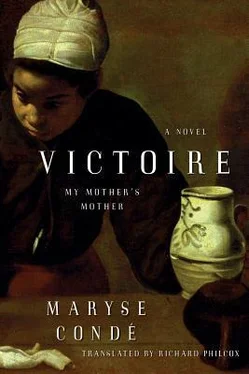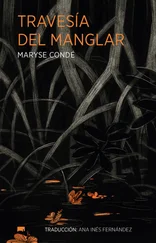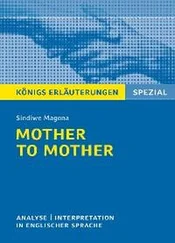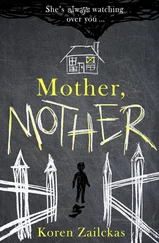Only Elie knew for certain who was Victoire’s father. He had bad-mouthed her and flown into enough tempers in his jealousy! What did she hope to get from this white man? A soldier into the bargain. A soldier’s like a sailor: instead of a woman in every port there’s one in every garrison.
Caldonia refused categorically to let the apple of her eye go. What would her life be without the girl she idolized? Victoire was five or six years old. The sound of her voice was seldom heard. Nor was there hardly a smile, a ripple of laughter, or one of those cabriole dances that make childhood so delightful. It was as if her joie de vivre had been buried with her maman. Her hair was so straight and smooth that any braids became undone in minutes and flopped over her face, covering it with a silky curtain of mourning. In order to soothe her nightmares, Caldonia put her to sleep in her bed. Night and day, huddled against her grandmother, she acquired the bitter smell of her old clothes. The smell of sweat, dirt, and arnica.
At this time, the very poorest were preoccupied with an education. Free schooling for all had been one of Monsieur Schoelcher’s promises, which they planned on keeping. The Brothers of the Christian Doctrine of Ploërmel had opened a school in Les Basses, where the airport now stands. Apparently, Caldonia didn’t think for one moment of enrolling Victoire. No more than she did her younger children. As a result, my grandmother never learned to read or write. She never learned to speak French correctly, and so as not to shock her daughter’s acquaintances, she kept a stubborn silence under all circumstances.
The only schooling she received — but can we really call it schooling? — was religious. Aurora Quidal taught catechism in her wattle cabin. Sitting in a circle, the children would chant, oddly alternating phrases in Creole and in French.
Ka sa yé sa: lanfé?
One God in three distinct persons.
Ki jan nou pé vinn pli bon.
Eat and drink. This is my body.
Throughout her life, Victoire, even though she never spoke of it, remembered her childhood as a paradise lost. It appears, however, that it was mostly dull, hardly entertaining, and darkened by poverty, which was the lot of the laboring classes.
The day would begin with the white light of dawn seeping through the commissures of the cabin’s only window. Oraison and Elie, up in the dark since three in the morning, prepared a billy can of food, then went to join Oraison’s brother before setting off to sea in the boat christened Ezékiel . One hour later Caldonia ventured out of doors. She emptied the toma of the night’s urine, rinsed out her mouth, and said her prayers: a dozen Hail Marys and two Our Fathers. She lit the fire in the hearth, three rocks arranged in a triangle, and while the water was boiling, she would shake Lourdes, the youngest, to take Théodora the cow to the pond, and then woke Félix and Chrysostome.
Breakfast, if we dare call it that, was quickly expedited. Mother and children dipped their stale slice of kassav in some weak tchòlòlò coffee. Depending on the time of year, Félix and Chrysostome would go down to the cane fields or hoe the family’s Creole vegetable garden while Lourdes, in charge of the household chores, would sweep the yard with a palm broom. Finally, Caldonia would enter the room where Victoire was sleeping. Then followed a long cuddling session that would have surprised a good many people. Where did Caldonia get this rosary of sweet talk from? These loving caresses? This fondling? She would carry Victoire to the water barrel. The water was cold. The little girl would whimper while her grandmother rubbed her dry and slipped on cotton panties that couldn’t hide her protruding belly button. Then she did her hair. Victoire only found consolation once she had been given her cereal flavored with cinnamon and sweetened with wild honey. Then Caldonia would gather up the bundles of dirty washing collected from the town during the week. Ever since the time of the great plantation houses, the women in her family had been washerwomen, and they were proud of this skill that placed them above the common lot. Finally, she set off for the washhouse.
This washhouse, the one at La Croix, no longer exists today. It was built over a spring, now dried up, but once bubbling and joyful, called Espiritu. A dozen washerwomen would be up to their thighs in the water. There would be a babble of creole, laughter and cries amid the slap and beating of clothes mingled with the smell of savon de Marseille and the Sainte-Croix eau de Javel . For Caldonia, Victoire was the most adorable little girl in the world, a gift from the Good Lord who had been meager in His generosity. A photo that no longer exists today or perhaps never existed, but that I can re-create, does not allow us to throw further light on the matter.
It wasn’t every day you had your portrait taken at La Treille. The photographer came from La Pointe with his magic box, his plates and black cloth. Oraison was dressed in his best suit. Black striped serge trousers. Jacket. Even a waistcoat. Bare headed. His badly combed mop of hair gives the final touch to his rustic look. Standing beside him, Caldonia is wearing her best Creole costume. Her madras headtie seems to me to be tied somewhat curiously. Its diagonal pleats are tight-fitting like a bonnet. The children are lined up in a row in front of the couple. In the center Victoire stands out like a chick among a brood of ducklings.
For most people Victoire was scary, with her skin too white and her eyes too light. A superstition coming from Nan-Guinnin claims that the souls of the dead, if they are lucky, manage to escape from the jars where they are held captive and slip into the bodies of children. Consequently, they reacquire the joy of living. This must have been the case for Victoire. She was one of the walking dead, a zombie. Sometimes she would grab a handful of guinea grass and chew on it. Most of the time her hands lay palms-up on her lap while she stared straight in front of her.
Others were convinced she was no less than Ti-Sapoti: that so-called orphan who haunts the roadside at night, dragging the passerby, who has the misfortune to stop and show compassion, into unknown regions. An ba la tè? No one knows where.
“Ka ou ka fé là, ti-doudou an mwwen?”
“What am I doing here?” Ti-Sapoti, dries his tears and becomes a predator.
When Caldonia had finished her washing, she crammed a bakoua hat onto Victoire and returned to La Treille. Lourdes had already put the root vegetables to boil and thrown in a hot pepper and a pig’s tail. They would always eat in silence. After lunch, Caldonia pounded her starch, carefully grinding the lumps. Then she would starch her washing and hang it out to dry. After that, usually flanked by Victoire, she would go down to the shore and wait for Oraison’s return. If she didn’t immediately take charge of the proceeds from the fish he had caught, he would distribute three-quarters of the money to his string of girlfriends and drink the remainder with his banélo of buddies. Each time, this return to land was a ritual. Oraison’s boat came into view on the horizon, made straight for the beach, then seemed to change its mind and head out for the open sea. Making a final skillful sweep, it would turn back toward the shore. It was then that the fishermen would jump into the waves and drag the boat behind them like a reluctant, untamed animal.
There came a softness in the evening air. The landscape imitated a picture postcard.
The sun drowned itself over by Dominica. With the irons laid on the burning coals of an outside stove, Caldonia would iron her washing after having smoothed it with candle wax. Oraison would be sucking on his pipe, while mending the mesh on his fish trap. Lourdes was simmering the thick soup. Félix and Chrysostome would be telling stories while roasting corn cobs that Victoire nibbled on. Oraison would often join in the conversation and come out with one of his half-invented stories that he was so good at.
Читать дальше












